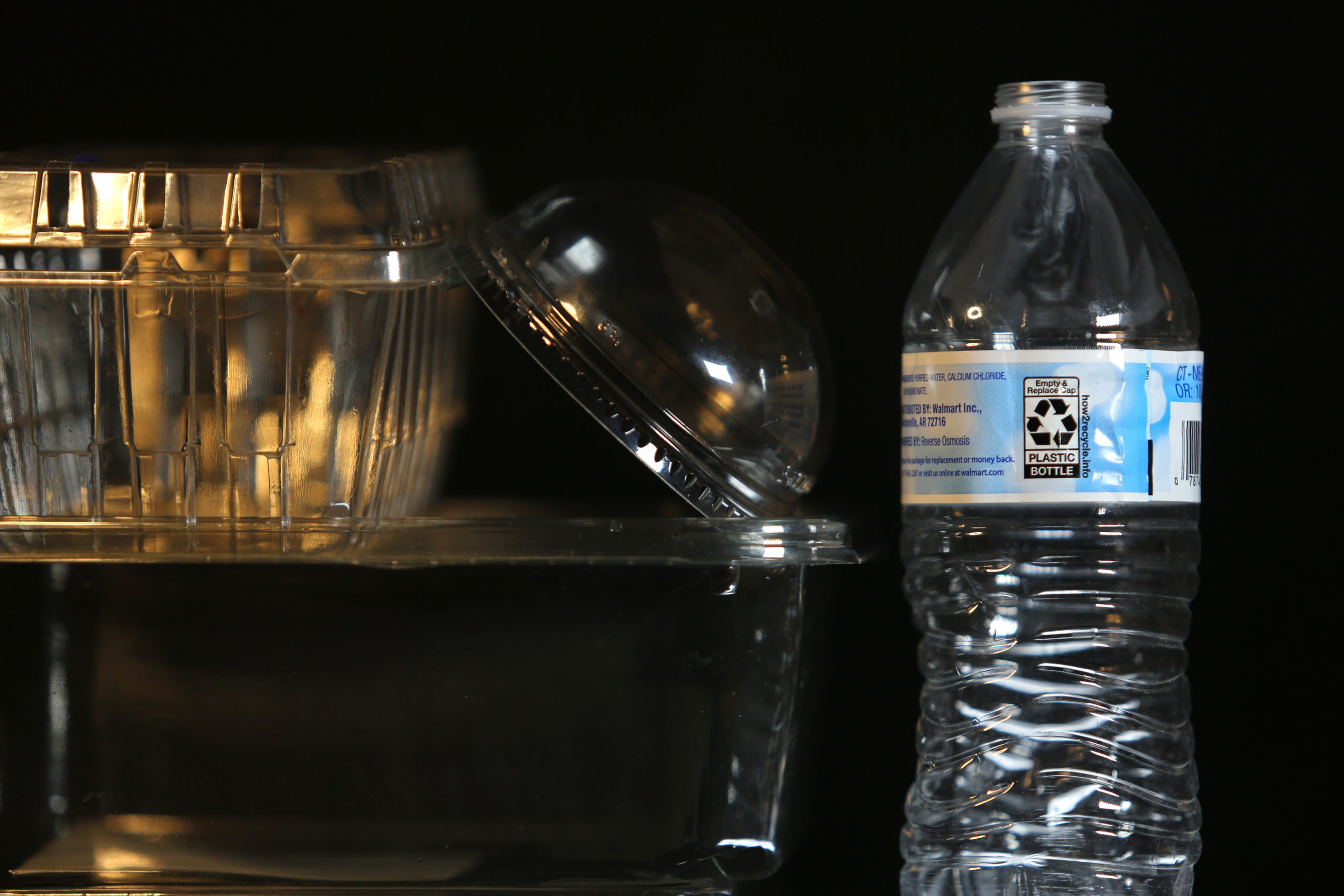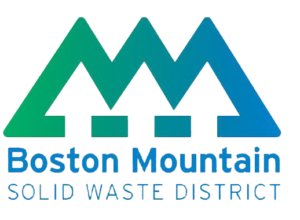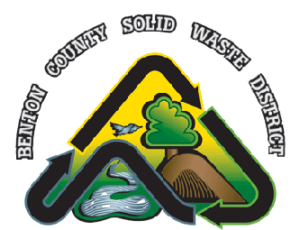Yes, plastics can be recycled in Northwest Arkansas.
Yes, plastics really are recycled when collected properly.
But “properly” is key, and other factors in how plastics are made and unmade muddle the rules and the benefits of recycling them. To keep it all straight, here are five simple truths about complicated plastic.
1. There are countless kinds of plastic.
You might recognize the 1-7 plastic numbering system, which stamps one of those numbers within a small triangle of arrows somewhere on many plastic containers. Those are broad categories for thousands of plastic varieties that all have their own chemical formulas and recipes.
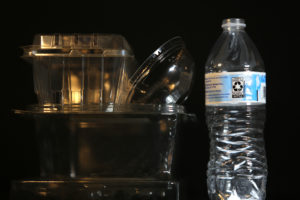
Salad bins, fruit containers, drink caps and water bottles are all labeled #1, but only the bottles can be recycled in NWA’s public recycling programs.
This means plastics showing the same number can still be distinct. For example, soda bottles and plastic tubs for blueberries or other produce are both labeled #1, but they are made differently and melt down differently. That’s why Northwest Arkansas recycling programs take the bottles — that is, containers that narrow to a neck at the top — but not the tubs.
2. Only some plastics are recyclable, and “recyclable” can mean different things.
In terms of physics and chemistry, just about any substance you can think of is technically recyclable – everything could be broken down somehow, somewhere. But as we talked about in an earlier post, recycling is an economic and manufacturing process. It has to be feasible and worth the cost to do so, and someone has to be ready to take the material and use it for a new purpose.
This setup exists only for certain kinds of plastic, creating a narrower definition of recyclable. And any given community might accept some of those plastics and not others, restricting recyclability even more.
Take polystyrene packaging, often (mistakenly) called Styrofoam. This plastic is recyclable in Northwest Arkansas because a drop-off center in Rogers accepts it, has machinery to process it and is connected to a manufacturer that buys it. But it’s not recyclable within any local curbside program because this chain isn’t in place.
- When in doubt, figure out: Check which plastics you can recycle in your city.
3. Mix-ups around Fact #2 cause problems.
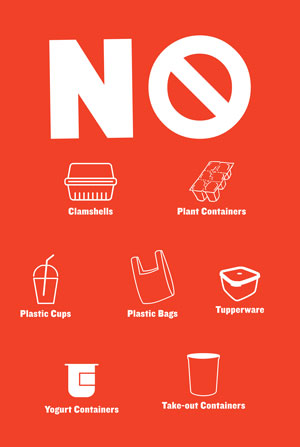
Fayetteville uses this graphic to help residents recycle the right plastics.
It’s a common refrain among recycling groups around the country that the three-arrow recycling symbol stamped on a plastic doesn’t automatically mean it can be recycled. Folks often mistakenly throw in anything marked with those arrows – yogurt cups, produce bins, you name it – even when their recycler asks them not to.
And what happens to the wrong plastic? It probably gets thrown away, which can make a simple misunderstanding look like deception.
Speaking of deception, some observers have said plastic companies intentionally mislead the public by using the symbol to improve their product’s image. The industry generally denies this, noting how far we’ve come with recycling technology and awareness. Regardless of intention, folks are more skeptical now, and we hear from locals every week who are unsure whether recycling does any good. Several states are looking to ban the symbol on materials that don’t meet recyclability standards.
4. Recycling correctly isn’t the only concern around plastic.
Recycled materials like steel, aluminum and glass can be melted down and recycled essentially forever with no issue. That’s not true for plastic, at least with conventional recycling. Plastic’s molecules tend to degrade and weaken with each use, meaning it lasts through only a couple cycles and is often “downcycled” from food containers like soda bottles into insulation and plastic parts that can’t themselves be recycled.
From a resource conservation standpoint, even downcycling is often better than not downcycling, since the main alternative is using only newly manufactured plastic. But plastic-making and recycling can also bring up other environmental issues.
5. Plastic is being recycled, and many groups are working on making the process better.
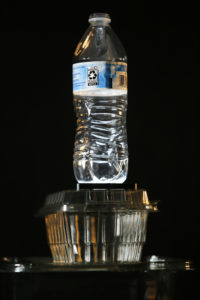 Speaking for NWA, we can confidently say that clean and properly collected local plastic goes to its intended purpose. Fayetteville, for example, last year sent almost 300 tons of plastic bottles to companies that make new bottles, decking and other outdoor products, pipes, and carpeting.
Speaking for NWA, we can confidently say that clean and properly collected local plastic goes to its intended purpose. Fayetteville, for example, last year sent almost 300 tons of plastic bottles to companies that make new bottles, decking and other outdoor products, pipes, and carpeting.
Cities such as Pea Ridge and Elm Springs have contracts that say their private haulers must not landfill collected recyclables. And several NWA companies use recycled materials for their business, including MoistureShield and eSCO Processing & Recycling.
More broadly, society is tackling plastic from several directions. Companies like Walmart are pushing for more of their suppliers’ packaging to be made of the recyclable kinds of plastic (and Walmart’s two-year grant created NWA Recycles, because it’s going to take an intentional, wide-ranging effort to keep our recyclables out of the Tontitown landfill.)
Others are looking for ways that plastic can persevere through more rounds of recycling. Some states are placing more responsibility on packaging manufacturers for helping recycle and dispose of their products. Groups like NWA Recycles are spreading the word about how our recycling systems really work. Some say we should just use less plastic, period.
Want to help? Start by sharing these facts with others and learning more about the right ways to recycle where you live.


